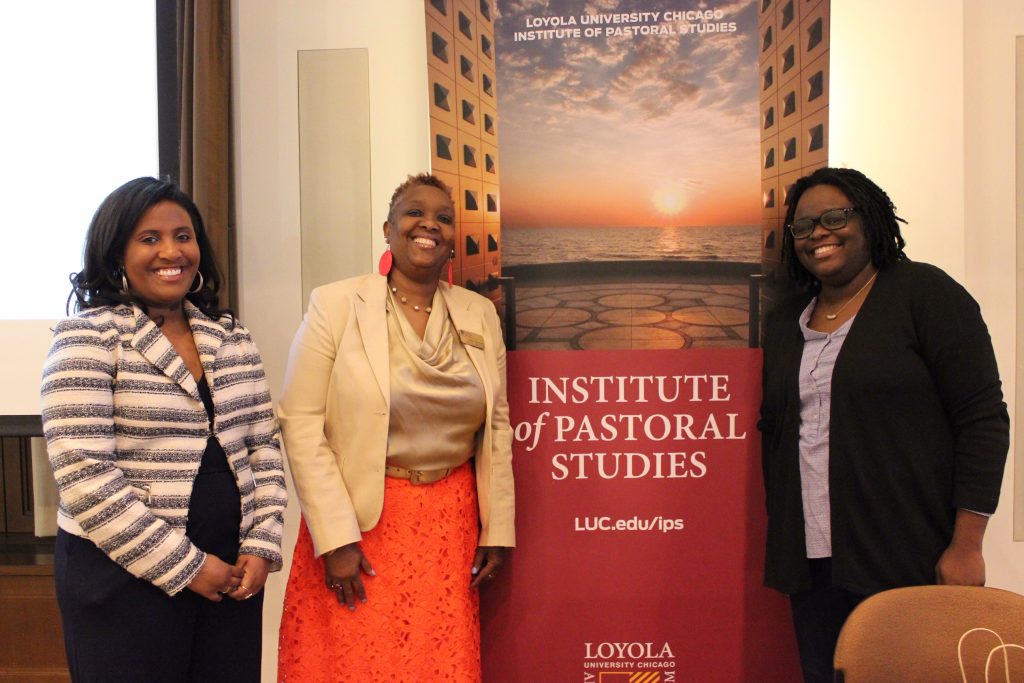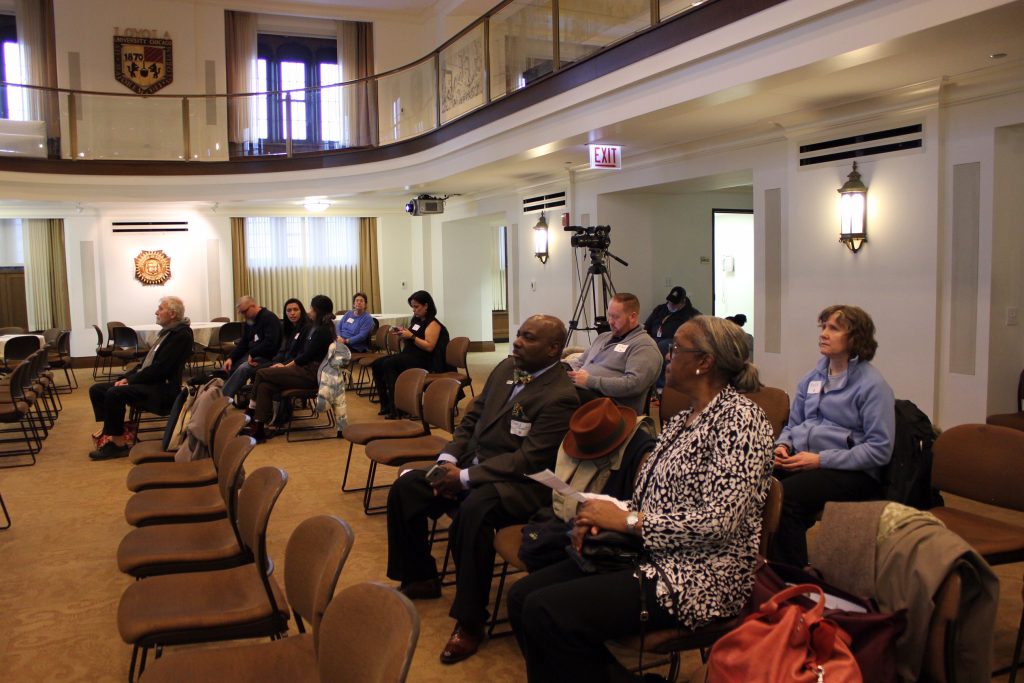Racism and The Church: A Community Conversation on ‘Open Wide Our Hearts’
On April 4th, IPS hosted Racism and The Church: A Community Conversation on ‘Open Wide Our Hearts’ at Regents Hall in Lewis Towers.

The IPS community gathered to explore further issues of race in our context and to foster a communal reflection and discussion. Panelists discussed the pastoral letter on racism (“Open Wide Our Hearts“) issued by the US Conference of Catholic Bishops (USCCB) in November 2018.
To view the livestream panel video, click this link.
To view photos, click this link.

SPEAKERS: Kandice Harris, Cynthia P. Stewart, Nephtalie Lesperance
Scheduled speaker Donna Grimes (Assistant Director of African American Affairs, Secretariat of Cultural Diversity in the Church, USCCB) was unable to attend but has graciously recorded a video of her thoughts on the ‘Open Wide Our Hearts’ pastoral letter.
To view Ms. Grimes’s video, please click on this link.
Donna Grimes has also provided the following summary of her thoughts on the November 2018 pastoral letter:
I can’t resist comparing the anticipation in the Catholic community surrounding this Pastoral Letter with the Muller Report. There are countless parallels – rising concerns, an urgent demand for explanations, cries for justice.
The emergency became evident for the bishops with violence in Charlottesville in August 2017. But, around the country, concerns have long been brewing in the Black community…the recorded beating of Rodney King, the killing of Amadou Diallo, the murder of Trayvon Martin, Michael Brown, Eric Garner, and so many more Black men. And, not to be forgotten, Black women – Sandra Bland, Rekia Boyd. And the children – Tamir Rice and many victims of drive-by shootings…Too many precious lives stolen. Few perpetrators are convicted and sentenced. Cases dropped. Not guilty verdicts. Few grieving families are comforted. Mainstream America’s response including that of the bishops has been anemic rather than outrage and policy. From the bishops we heard: Stay peaceful, pray, don’t turn your anger toward the police and All Lives Matter.
Why haven’t our church leaders probed and responded to the underlying issues? I believe it’s because with the exception of abortion, they are mainstream America. Without taking anything away from individual bishops – particularly in areas with headline cases who reacted with public statements of compassion and community level action – what I’m saying is that their silence has been maddening! And, there’s no excuse for apparent lack of awareness or understanding of institutional racism. Fr. Bryan Massingale’s book, Racial Justice and the Catholic Church and Michelle Alexander’s The New Jim Crow have been available for a decade.
The key contribution of this Pastoral Letter has been a platform — to open the door to dialog and action; to begin or resume the work of dismantling racism; to engage in difficult conversations together and within our own circles about racism in the neighborhood and in the Church. What we can do is not change the channel. We should address racism together at times, but it’s vital to work on racism within our own groups. In-group conversations will differ for White people and People of Color. For instance, White people could focus on white identity, what it means to be White in America and in the world and learning real American history. People of Color could examine how they internalize racialized messages and concentrate on empowerment strategies. The Pastoral Letter encourages self-reflection for everyone without implying that everyone should reflect in the same way.
I appreciate various critiques I’ve read about the Pastoral Letter Against Racism. Whatever shortcomings are exposed in the text of Open Wide Our Hearts, I have to give credit where it’s due. For instance, despite advice to center on the abuse crisis exclusively at their November 2018 meeting, they decided to keep the letter on their agenda. Then the bishops approved it with a nearly unanimous vote (2 no, 1 abstention). Bottom line (P.4): What they said was, “What is needed, and what we are calling for, is a genuine conversion of heart, a conversion that will compel change, and the reform of our institutions and society.”
Conversion of heart that compels change and reforms our institutions and society is a heavy lift. But, we can do all things through Christ who strengthens us!
The bishops are correct about what is needed but can we honestly expect them to know how to make it happen? As Dr. Shawnee Daniels-Sykes (Mt. Mary University) pointed out in a recent post about the Pastoral Letter, it’s only been 50 years since racial segregation was “outlawed.” But, this is a young country and we have a much longer history of subjugating Black people, other people of color and poor white people.
The good news is that the ball is in our court now. We could press our own bishops to say more (and do more) to manifest their conviction that Racism is a Life Issue. Ask, what’s the plan for the diocese for dismantling racism? How will dismantling racism be addressed in seminaries? Catholic schools? Parishes? How will this imperative play out in hiring and contracting practices? In the distribution of resources? Ask your pastor to preach on racism, to create space for courageous conversations in the parish. The Pastoral Letter calls on all elements of the Church to take action: individuals, families, institutions and organizations.
Catholic colleges, universities – even pastoral institutes – have tremendous opportunities to study, reflect and act; and most importantly, to form anti-racist actors who are our future lawyers, doctors, educators, policy-makers, parents, clergy, business owners, etc. This means acknowledging the unspoken American value of White Supremacy, a cultural value that is right up there with Freedom and Democracy, recognizing White Privilege, facing White Fragility about race and overcoming these impediments to racial justice.
USCCB staff are finding their way toward implementing the Pastoral Letter Against Racism and assisting Catholic entities to do the same. Offices are being reminded of the bishops’ stated commitment to engage in efforts to resist racism – to reconsider their approaches, resource materials and methods of advancing the Church’s mission via evangelization and catechesis, youth ministry, priestly formation, and liturgy for example. In some cases, it’s as fundamental as pointing out that there are other people in the room and one size does not fit all.
One action that I’m especially excited about is working with Catholic schools to address how the history of Native Americans and African Americans is presented in the curriculum. Another is the listening sessions that the Ad Hoc Committee and staff are arranging in dioceses around the country. A Study Guide is in development. The USCCB website provides numerous resources e.g., K-12 lesson plan suggestions, brief backgrounders and parish aids, with more coming.
I’m encouraged by more bright lights, e.g., the creativity of Youth artist-activists like the spoken word collaborative, Split This Rock, by which a diverse group of teens use poetry and art to explore social justice issues. And, there are the emerging young community organizers who tackle the intersectionality of race with other justice issues.
Speaking of organizers, this reminds me that the Catholic Campaign for Human Development (CCHD) has been going strong for 50 years. Read stories of hope as CCHD funds racial & economic justice empowerment projects.
I’d like to close with this inspiring message sent by a friend:
A door is much smaller than the house
A lock is much smaller, compared to the door
A key is the smallest of all,
but a key can open the entire house
Thus a small, thoughtful solution can solve major problems.
Let’s get started!
Thank you to all the speakers and those who attended for their presence and commitment to ensuring our faith community remains dynamic and inclusive.

To learn more about IPS, go to https://www.luc.edu/ips/.
For those interested in applying to IPS, go to https://gpem.luc.edu/apply/.